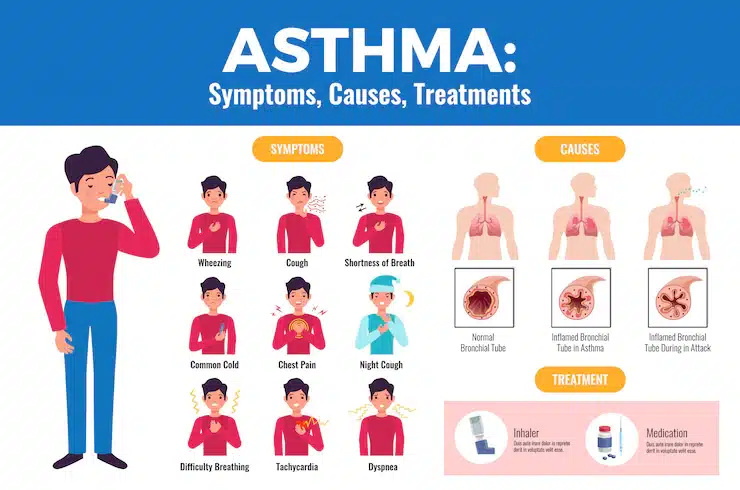Introduction
Wheezing is a common symptom of respiratory problems, characterized by a whistling or whistling sound when breathing. It can be caused by a variety of conditions, including asthma, chronic obstructive pulmonary disease (COPD), and bronchitis. While wheezing can be treated with medication, there are also several natural remedies that can help to alleviate symptoms.
What is wheezing & its causes

Wheezing is a whistling or whistling sound that occurs when breathing, usually as a result of narrowed or obstructed airways. It can be caused by a variety of conditions, including asthma, chronic obstructive pulmonary disease (COPD), and bronchitis. Other causes of wheezing include allergies, exposure to irritants, and viral infections.
Home remedies for wheezing
Drink warm liquids
Drinking warm liquids, such as water, herbal tea, or chicken soup, can help to soothe irritated airways and reduce wheezing. The steam from the warm liquids can also help to open up the airways.
Vasaka (Malabar Nut)
Vasaka, also known as Malabar nut, is a herb that has been traditionally used to treat respiratory conditions such as wheezing. It is believed to have anti-inflammatory and bronchodilator properties that can help to open up the airways and reduce wheezing.
Inhale moist air
Inhaling moist air can help to soothe irritated airways and reduce wheezing. This can be done by taking a hot shower, using a humidifier, or inhaling steam from a bowl of hot water.
Tulsi
Tulsi, also known as holy basil, is a herb that has been traditionally used to treat respiratory conditions such as wheezing. It is believed to have anti-inflammatory and bronchodilator properties that can help to open up the airways and reduce wheezing.
Ginger
Ginger has anti-inflammatory properties that can help to reduce inflammation in the airways and reduce wheezing. It can be consumed in the form of tea, capsules, or as a spice in cooking.
Mulethi
Mulethi, also known as licorice root, is a herb that has been traditionally used to treat respiratory conditions such as wheezing. It is believed to have anti-inflammatory and expectorant properties that can help to open up the airways and reduce wheezing.
Breathing exercises
Breathing exercises, such as deep breathing or pursed lip breathing, can help to open up the airways and reduce wheezing.
Hot herbal tea
Drinking hot herbal tea made with ingredients such as ginger, tulsi, licorice root and vasaka can help to soothe irritated airways and reduce wheezing.
Other prevention methods
Eat more fruits and vegetables
Eating a diet that is rich in fruits and vegetables can help to boost the immune system and reduce the risk of respiratory infections, which can lead to wheezing.
Quit smoking
Smoking is a major risk factor for wheezing and other respiratory problems. Quitting smoking can help to reduce the risk of wheezing and improve overall respiratory health.
Don’t exercise in cold, dry weather
Exercising in cold, dry weather can irritate the airways and increase the risk of wheezing. It’s best to avoid strenuous exercise in these conditions, or to wear a scarf or mask to protect the airways.
Try pursed lip breathing
Pursed lip breathing is a technique that involves breathing in through the nose and out through the mouth, while puckering the lips as if blowing out a candle. This can help to slow down breathing and improve the flow of air through the airways, reducing wheezing.
Using humidifiers
Using a humidifier can help to add moisture to the air, which can help to soothe irritated airways and reduce wheezing. It is especially helpful during the dry winter months.
Conclusion
Wheezing is a common symptom of respiratory problems that can be caused by a variety of conditions. While medication can be used to treat wheezing, there are also several natural remedies that can help to alleviate symptoms. Drinking warm liquids, inhaling moist air, and using herbs such as vasaka, tulsi, ginger, mulethi can help to soothe irritated airways and reduce wheezing. Additionally, eating a healthy diet, quitting smoking, and avoiding exercise in cold, dry weather, can help to prevent wheezing. It is important to consult a healthcare professional before trying any new remedies and to follow their treatment plan.
FAQs:
What is the fastest way to relieve wheezing?
The fastest way to relieve wheezing is to use a bronchodilator inhaler, such as albuterol or levalbuterol, as they can open up the airways and reduce wheezing within minutes. However, it is important to consult a healthcare professional before using any medication, as they can have side effects and may not be suitable for everyone.
What helps wheezing naturally?
Some natural remedies that may help to relieve wheezing include drinking warm liquids, inhaling moist air, using herbs such as vasaka, tulsi, ginger, mulethi and taking deep breaths or doing breathing exercises. However, it’s important to consult a healthcare professional before trying any new remedies, as some may interact with other medications or be contraindicated for certain conditions.
What are the 3 main causes of wheezing?
The three main causes of wheezing are asthma, chronic obstructive pulmonary disease (COPD), and bronchitis. Asthma is a chronic condition characterized by inflammation and narrowing of the airways, while COPD is a group of lung diseases that cause breathing difficulties. Bronchitis is an inflammation of the airways that can be caused by viral or bacterial infections.
What is the best medicine for wheezing?
The best medicine for wheezing depends on the underlying cause of the condition. Inhaled bronchodilators, such as albuterol or levalbuterol, are often used to open up the airways and relieve wheezing. Corticosteroids, such as fluticasone, can also be used to reduce inflammation in the airways. Antihistamines, such as cetirizine, can be used to relieve symptoms of allergic wheezing. It is important to consult a healthcare professional to determine the best medication for your condition, as some may have side effects or contraindications.
Our Hospital Locations
General Surgery Hospitals in Chandigarh | General Surgery Hospitals in Bangalore | General Surgery Hospitals in Jaipur | General Surgery Hospitals in NCR | General Surgery Hospitals in Hyderabad
Our Doctors
General Surgery Doctors in Chandigarh | General Surgery Doctors in Bangalore | General Surgery Doctors in Jaipur | General Surgery Doctors in NCR | General Surgery Doctors in Hyderabad
About the Author

Dr. S. Goel
Dr. S. Goel is a renowned Internal Medicine Specialist currently practicing at Ayu Health, Bangalore. He is a Specialist in Internal Medicine, Diabetes HTN, Paediatric Care, and Family Medicine.




